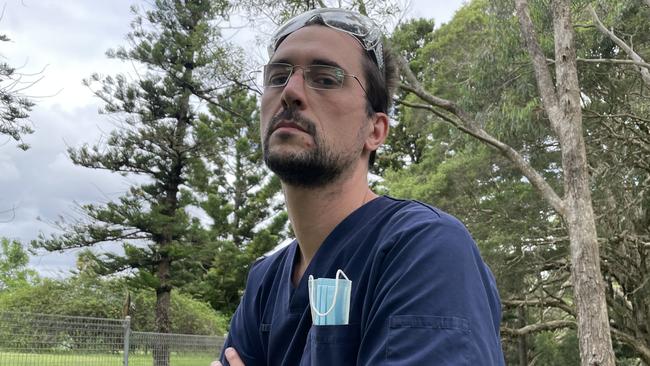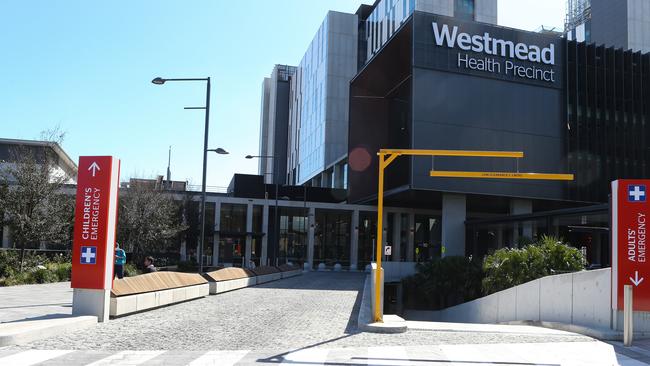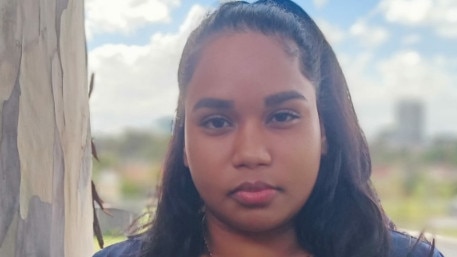Cumberland, Westmead, Blacktown mental health nurses want urgent help
They care for society’s most volatile but exhausted mental health nurses are struggling with their own battles as some work 16-hour days through the pandemic. They have warned industrial action will be ‘furious’ if pleas are ignored.
Parramatta
Don't miss out on the headlines from Parramatta . Followed categories will be added to My News.
Burnt out mental health nurses in western Sydney are threatening “furious’’ strike action if the government fails to boost nurse numbers.
NSW Nurses and Midwives’ Association delegate Nick Howson has broken his silence after being fed up with years of deteriorating conditions for mental health nurses at Cumberland and Westmead hospitals, and Bungarribee House at Blacktown.
Since Covid, he said there had been “a lot more staff burnout” with unsuitable conditions, including multiple patients in dormitory-like rooms, exacerbating conditions.
“It’s not something as a mental health nurse you particularly think you have to deal with, nor is the environment that we work in equipped to deal with airborne infection at all, given the age of a lot of mental health facilities,’’ he said.
“They are often shared rooms, they don’t have ensuite toilets and people can be quite crowded in.’’

Apart from having “a base level of medical knowledge and physical health knowledge,’’ mental health nurses are not trained to treat Covid patients.
“But we’re still dealing with having to monitor people physically more closely than we would normally have to and the wards are not set up for that,’’ Mr Howson said.
“We don’t have as many machines to take blood pressure and vital signs as much as a general hospital would.’’
The pandemic has also worsened patients’ mental states, he said.
“There’s a lot of increased anxiety, especially when the outbreaks have actually occurred in some of the wards,’’ Mr Howson said.
“People do get very, very worried and obviously people who are in a mental health ward with some anxiety conditions, do struggle more than they normally would, with a couple of panic attacks and those sorts of things.
“A lot of patients would have to be locked away because we can’t leave them out and about in an environment where people might harm themselves or damage equipment.’’
Mr Howson said there were more than 600 shifts of overtime clocked in December, with some staff working 16-hour days.
Nurses are calling for the government to address ratios with at least one extra worker per shift.
“As a specialty, we’ve always felt somewhat maligned and forgotten,’’ Mr Howson said.
“It’s (mental health) not something people come across and we often get forgotten for funding and in the general eyes of the public, but we are dealing with the exact same struggles as everyone else at the moment and it’s always been a chronically under-resourced area simply because it’s a speciality and not everyone wants to do it because it is very hard.
“It requires a certain level of emotional intelligence and empathy to do and you have to be very balanced in both taking on an emotional load from an extremely vulnerable patient as well as managing your own feelings. It’s exhausting.’’

Mental health nurses care for patients whose conditions range from anxiety and depression, to drug-induced psychosis and schizophrenia and there are 260 beds at Cumberland Hospital.
Mr Howson lashed out at both the state and federal governments for their treatment of the specialty nurses.
“I very much think it’s a failure of our state and federal governments when it comes to successive years of hostility towards public institutions in general — just chronic underfunding, staff freezes, pay freezes, the whole kit and kaboodle.’’
He said more staff would quit if conditions do not improve. Nurses are also prepared to strike if the government overlooked requests for more staff.
“They need to get on board with the ratios campaign,’’ he said.
“And the research is out that shows places that implement nurse-to-patient ratios have better outcomes for patients, less short-term readmissions and the money that costs to hire extra nurses is more than recovered by the lack of people presenting back to hospital with something that would have been caught if people weren’t overworked.
“If they actually took the time to talk to the people doing the work, they would know that things are not all right and they haven’t been all right for a very long time.’’

Industrial action might not be imminent but it has not been ruled out.
“The timing’s not right and when it comes it will be furious,’’ Mr Howson said.
“There will be strikes. We’re never going to endanger patient care but my argument is it’s not us endangering patient care at the moment — it’s the state government not providing us with the right resources.
“It really comes down to the government to make the situation better and the people of NSW deserve more. They deserve better when they’re in the hospital and they deserve less overworked nursing staff.’’
Fellow western Sydney mental health nurse, Shivani Singh, echoed Mr Howson’s calls not to neglect patient and staff support.
“Sometimes we feel like these mental health patients can be neglected just because there’s been a long-term stigma attached to them,’’ Miss Singh said.
“People think that they’re just having a bad day or ‘they’re just moody today or depressed’ but they haven’t looked deeply into what mental health actually is and can be.’’
Like many of her colleagues and Mr Howson, patients have physically harmed Miss Singh at work.
“Sometimes they act out and because of Covid and the pandemic the anxiousness adds to that,’’ she said.
“The lockdowns don’t help either.’’
A Western Sydney Local Health District spokesman acknowledged staff “through the challenges and unpredictability posed by the Covid pandemic”.
“There is no doubt that the pandemic has created enormous challenges for all of our health workforce, and they are continuing to do incredible work during these circumstances,’’ the spokesman said.”
Our mental health units in Western Sydney Local Health District are stable, with no increase to inpatient admissions’’.
The spokesman said mental health nurses and frontline staff had received infection prevention and control training accredited by the NSW Health Clinical Excellence Commission.
“While this may be a stressful time for some of our patients, our mental health nurses are well trained to support their wellbeing,’’ he said.
“WSLHD staff have wellbeing support available to them and access to free, confidential and professional counselling through our Employee Assistance Program.’’
NSW Health Minister Brad Hazzard was also contacted for comment.
MORE NEWS
More Coverage
2021 NSW HSC students who came first in course
Westmead Hospital emergency department staff ask NSW Premier for help




